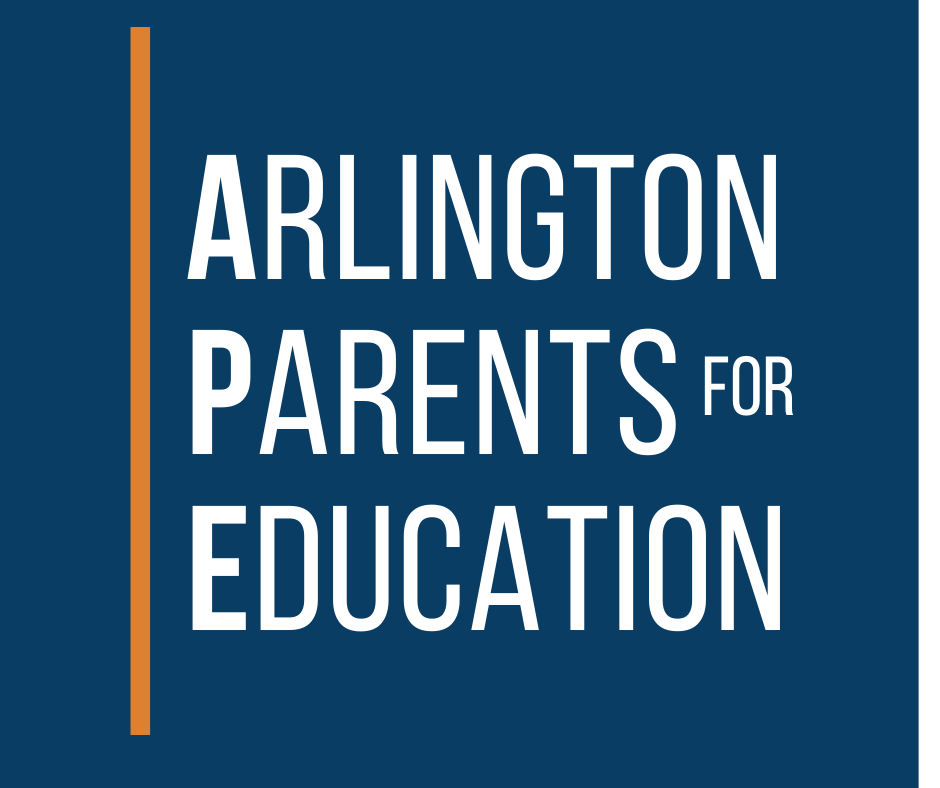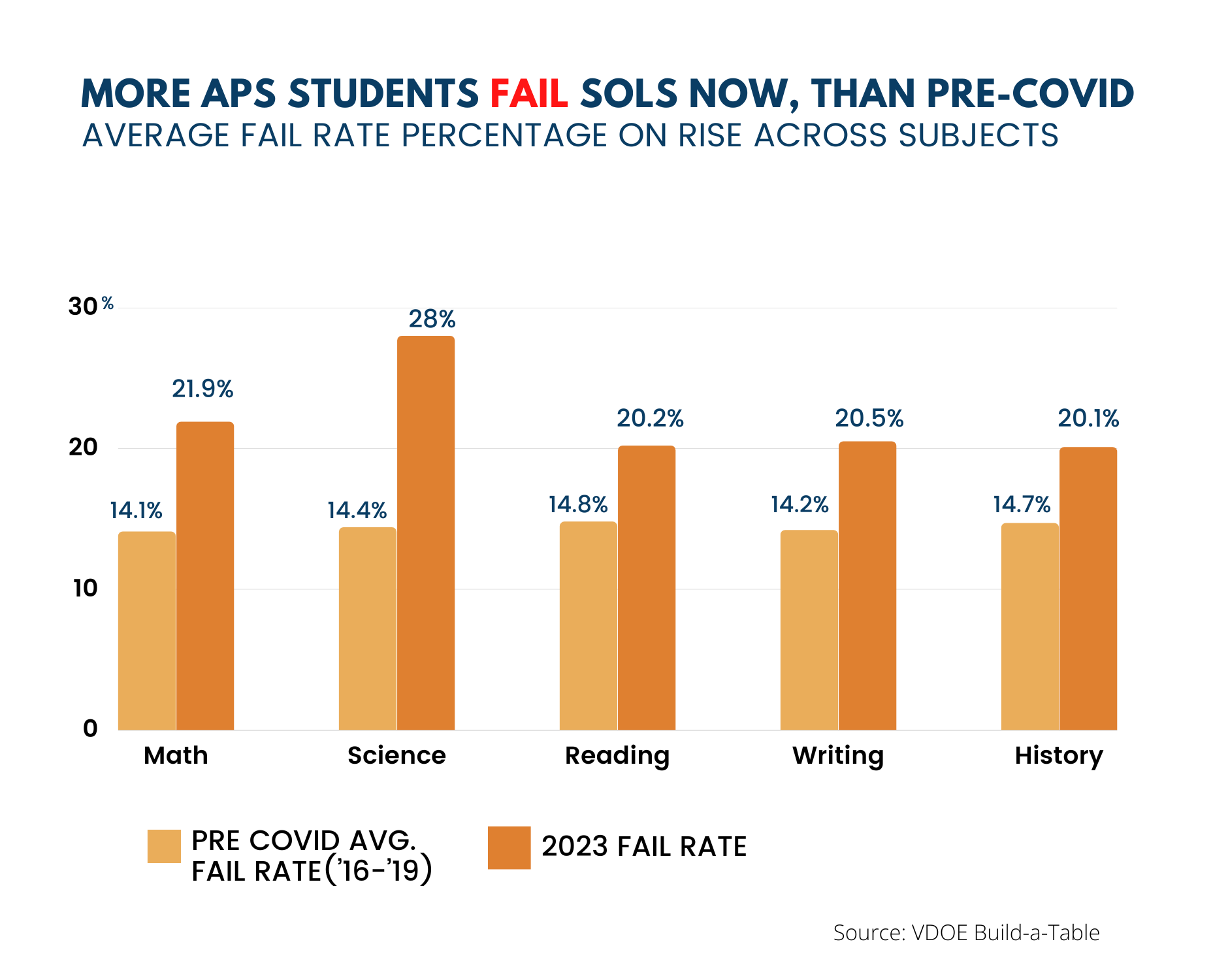e-news: September 27, 2023
In This Edition:
1. SOL Data Reflect Continued Learning Loss: APS Must Act
2. Excessive Leave Policy For Administrators
3. Parent's Corner: APS Needs to Improve Operational Effectiveness
4. What We Are Reading
4. 9/21 School Board Recap
5. Happening Soon
SOL Data Reflect Continued, Substantial Learning Loss:
APS Needs to Act More Aggressively
Standards of Learning (SOL) data published this month reflect that APS students are still suffering substantially from learning loss. More than 1-in-5 students failed the SOLs in each subject. Depending on the subject, the 2023 rate of SOL failure represents a 35 to 90 percent increase in the percent of students failing the SOL compared to the average failure rate pre-COVID (calculated as the average failure rate from years 2015-16 through 2018-19).
This increased failure rate has resulted in over 1,000 more students failing the SOLs in both reading and math in 2023 compared to before the pandemic.
As reflected in our September 19th letter to the APS Board, academic excellence also suffers: in 2023, APS had 5 to 10 percent fewer students scoring at advanced levels in reading, writing, science and math compared to five years earlier, which equates to 1,000 fewer APS students scoring at advanced levels in math. For vulnerable populations, including economically-disadvantaged, Black and Hispanic students, the achievement gap in the SOL pass rate has ballooned from 20-25 percentage points pre-COVID, to a gap of 30-35 percentage points in 2023. Across every subject, 40-50 percent—nearly half—of economically-disadvantaged students are not passing Virginia’s Standards of Learning exams.
Why This Matters:
Recent SOL data confirm that APS students are continuing to suffer from large learning losses and that current remediation efforts are not creating district-wide progress. Worse yet, the data show that recovery is slowing or even reversing. In the 2022-23 school year, pass rates on the reading and writing SOLs actually declined from the prior year, and pass rates in science were flat. Even in math, APS saw only a 4 percentage point improvement in pass rates compared to 2021-22 (still 9 percentage points under 2018-2019 rates).
APS needs to quickly take aggressive action to reverse these trends; it needs to implement an intensified tutoring program, develop a concrete plan to close achievement gaps, and renew its culture of academic excellence.
Our Take: For three years now, we have been advocating for an urgent focus on prioritizing remediation from learning loss and the widening achievement gap by instituting large-scale investments for intensified tutoring and additional instruction time (See this 2021 letter to the board, this analysis of learning loss, and this 2022 letter to the superintendent). These are the actions education leaders say are necessary, and which districts around the country are taking. Without these investments, our students are likely to take years to recover from learning loss, if at all.
The Virginia State legislature this month approved $418 million for learning loss remediation, and encouraged districts to devote 70% to high-intensity tutoring. The VDOE has issued a playbook to implement that tutoring, and the governor has called for all districts to begin such programs by October 16th.
We asked that APS use its Instructional Vision work session this week to develop a concrete plan to narrow the achievement gaps to 2015 levels within two years, with the goal to further narrow the gap after that. Unfortunately, the Board took neither action during that work session.
Read our recent letter to the School Board.
Watch our recent School Board meeting remarks here and here.
Excessive Leave Policy for Administrators
As previously noted, APS adopted a policy two years ago wherein 12-month employees receive around 30 days of vacation per year (31 in 2022-23, 27 in 2023-24). We previously estimated a cost of $8 to $9 million for the value of replacing the lost work time. For those in the Arlington Schools Administrator union, this policy was partially codified in its CBA approved by the School Board in July, effective for the 2023-24 school year. The CBA gives administrators paid leave for all of winter and spring breaks. APS policy addresses religious leave and cultural leave, providing for paid leave for all 12-month staff on newly added holidays.
Some have justified the additional paid time off by arguing it is needed for Arlington to stay competitive with neighboring districts. Based on our research, however, it appears that APS administrators now work at least 7-10 days fewer than neighboring districts. In addition to accrued leave, in 2023-2024 Arlington 12-month administrators are receiving 27 vacation days, resulting in 233 work days. All of Arlington’s neighboring districts maintain a larger number of work days: Alexandria (240), Loudoun (241), Montgomery (242), Prince William(243), Fairfax (243). Notably, Alexandria is the only other district which gives 12-month employees paid leave for all of winter and spring breaks.
Why It Matters: APS and the School Board are due to renegotiate the Arlington Schools Administrator’s CBA this year for a three-year term. Additionally, the recently adopted calendar policy enshrines seven new holidays for twelve-month employees. We advocate that APS should either 1) amend the vacation policy or 2) negotiate other concessions that can account for the several millions of dollars—and a concomitant decline in operational effectiveness—that this benefit is currently costing the school system. This reduction in APS’ administration’s work days may be contributing to a reduction in APS’ operational effectiveness, as an array of administrative issues continue to arise: last-minute health insurance changes, an increasing lack of responsiveness to staff concerns from APS’ HR department, recent failures to properly equip teachers with badges and keys at the start of the school year, etc.
The Board should also direct APS’ internal auditor to independently evaluate this policy and its cost to APS.
Parent's Corner: APS Needs to Improve Its Planning and Operational Effectiveness
(Editor's Note: From time to time, we will offer a perspective written by an APS parent or teacher on a topic of concern or interest for APS. What follows has been only lightly edited for clarity.)
Watching the comments at the latest School Board meetings, I could not help but have concerns about the ability of APS leadership and/or the Board to engage in meaningful planning and operational execution. I have watched the Arlington Public Schools over the last few years, and have observed a number of issues that appear to originate from lack of planning and from basic operational breakdowns. Those issues have included:
In 2021, APS was unable to offer summer school to all students to whom it was promised due to a failure to plan for sufficient teachers;
In fall of 2021, APS launched the virtual learning program without sufficient planning for teachers or administrators;
In 2022, APS faced a crisis of insufficient staffing for foreign language teachers, leading to concerns raised by both teachers and students; and
In Spring 2022, APS adopted a CIP plan that would spend $170 million for the career center without a plan regarding what programs, seats, or students would be served with that building;
This fall has seen APS continue this pattern:
APS issued a plan to turn Nottingham into a “swing space” to be used for students whose schools are being refurbished. But APS had not identified if, when, or where such school refurbishments would even take place. Given that APS has nearly maxed out its debt payment ratio, it seems unlikely that such refurbishments will happen in the next several years.
APS announced a plan to change middle school boundaries without sufficiently considering the impact on walkability of schools. It has since paused that plan.
At this last Board meeting, we heard that APS implemented SEL instruction during periods students used for studying, without apparently considering the impact it would have on students; and
Most recently, APS waited until the last minute to inform personnel of a significant change in health care providers, even though it knew such change would happen by at least July of this year.
And these are only the most publicly visible issues. I am aware of parents complaining of teachers with frequent absences from classes, special educational instructional services not being provided, and complaints from teacher applicants about slow processing times for new applications at Syphax. The past Board meeting also brought complaints about teachers not being provided keys to their own classrooms.
APS has invested heavily (some would say too heavily) in bulking up its administrative functions at Syphax. Notwithstanding the creation of the Superintendent’s “Cabinet,” APS appears to lurch from crisis to crisis, with frustrated parents, teachers, students and staff appearing like a carousel at School Board meetings to address the latest problem created by decisions that were not properly planned, were poorly executed, or were not well communicated in advance. Leaving aside the immediate impacts on students, all of those operational problems result in weeks of management and Board attention, which distracts attention from solving the pressing educational issues APS faces.
The Board has directed APS for the past two years to improve its operational efficiency. The Board should include operational effectiveness in that direction. APS could reduce the level of School Board drama if it operated as a more well-oiled machine.
September 21st School Board Meeting Recap
Key takeaways from the September 21st School Board Meeting are:
Dr. Durán explained the procurement decision to choose CareFirst BlueCross-Blue Shield as APS' sole healthcare option starting January 1st, 2024, apologizing for not informing staff earlier and explaining why Kaiser was not selected.
New MOU increases School Safety Coordinators (SSC) to 40, new leadership under Director Mr. Queen, a former School Resource Officer (SRO).
Chief of Staff Special Advisor Jonathan Turrisi, Strategic Plan leaders, and consultants from RTI International presented a report on the Strategic Plan Development process.
APS hired an internal auditor, who presented the proposed Internal Audit Annual Plan. Blount-Fenney said she is interviewing school treasurers, creating training materials, and reporting to the Audit Committee monthly. Kadera clarified that Blount-Fenney does not report to Superintendent or COO, but to the School Board, and that "there's a firewall between the two."
Our Take: We support the move to a more independent reporting structure. Watch our advocacy for an independent auditor and read more about one area we think they should focus on.
The Board presented its Draft Budget Direction, with Kadera and Goldstein asking for edits to clarify budget direction, specifically that the planning factors study is a major priority for APS and that impacts of all budget initiatives will be measured. Kadera also asked that APS develop policy and discipline with regard to reserves spending.
Read the full recap.
Happening Soon
Wednesday, September 27, 8 AM: Policy Subcommittee Meeting. Syphax, Suite 260.
Wednesday, September 27, 6:30-8:30 PM: APS Strategic Plan Community Forum. Wakefield High School. (Note: This session will be held in Spanish with interpretation available in English)
Friday, September 29, 8 AM: Audit Committee Meeting. Syphax, Suite 260.
Tuesday, October 3, 6:30-8:30 PM: APS Strategic Plan Community Forum. Yorktown High School.
Don't forget! You can subscribe to APS School Calendars here.



